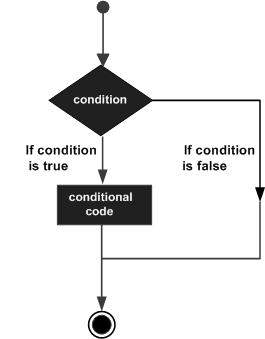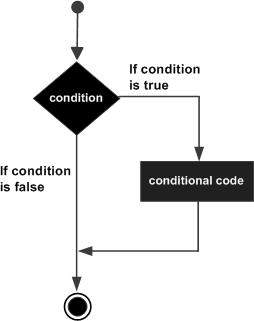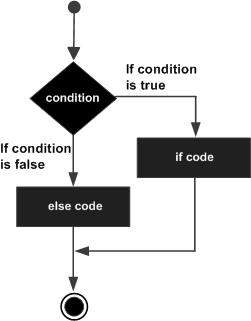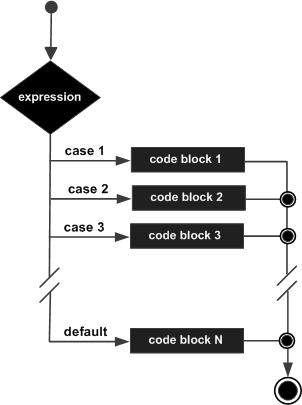决策结构要求程序员指定一个或多个要由程序评估或测试的条件,以及在条件被确定为真时要执行的一个或多个语句,以及可选的,如果条件要执行的其他语句被认定是假的。
以下是大多数编程语言中的典型决策结构的一般形式

C++编程语言提供以下类型的决策制定语句。
| 类型 | 声明和说明 |
| if 语句 | 'if'语句由一个bool表达式后跟一个或多个语句组成 |
| if...else 语句 | 'if'语句后面可以跟一个可选的'else'语句,该语句在bool表达式为false时执行 |
| switch 语句 | 'switch'语句允许根据值列表测试变量的相等性 |
| 嵌套if语句 | 您可以在另一个“if”或“else if”语句中使用一个“if”或“else if”语句。 |
| 嵌套switch语句 | 您可以在另一个'switch'语句中使用一个'switch'语句。 |
If 语句
-
句法
C ++中if语句的语法是 -

1 if(boolean_expression) { 2 // statement(s) will execute if the boolean expression is true 3 }
如果布尔表达式的计算结果为true,那么将执行if语句中的代码块。如果布尔表达式的计算结果为false,那么将执行if语句结束后(在结束大括号之后)的第一组代码。
-
流程图

- 例
 View Code
View Code
编译并执行上述代码时,会产生以下结果
 View Code
View Code
For English visitors,please click here
If...else 语句
一个如果语句可以跟着一个可选的其他语句,当布尔表达式是假的,其执行。
-
句法
C ++中if ... else语句的语法是 -

1 if(boolean_expression) { 2 // statement(s) will execute if the boolean expression is true 3 } else { 4 // statement(s) will execute if the boolean expression is false 5 }
如果布尔表达式的计算结果为true,那么将执行if代码块,否则将执行代码块。
-
流程图

-
例

1 #include <iostream> 2 using namespace std; 3 4 int main () { 5 // local variable declaration: 6 int a = 100; 7 // check the boolean condition 8 if( a < 20 ) { 9 // if condition is true then print the following 10 cout << "a is less than 20;" << endl; 11 } else { 12 // if condition is false then print the following 13 cout << "a is not less than 20;" << endl; 14 } 15 cout << "value of a is : " << a << endl; 16 return 0; 17 }
编译并执行上述代码时,会产生以下结果 -

1 a is not less than 20; 2 value of a is : 100
-
if ... else...if ... else
一个如果语句可以跟着一个可选否则,如果...别的语句,使用单如果...否则,如果声明,这是非常有用的,以测试各种条件。
当使用if,else if,else语句时,要记住几点。
-
一个if可以有零个或一个其他的,它必须在任何其他if之后。
-
如果是的话,if可以有零到多个,并且它们必须在else之前。
-
一旦其他成功,如果其他人将被测试,否则他没有留下其他人。
-
句法
C ++中if ... else if ... else语句的语法是

1 if(boolean_expression 1) { 2 // Executes when the boolean expression 1 is true 3 } else if( boolean_expression 2) { 4 // Executes when the boolean expression 2 is true 5 } else if( boolean_expression 3) { 6 // Executes when the boolean expression 3 is true 7 } else { 8 // executes when the none of the above condition is true. 9 }
-
例

1 #include <iostream> 2 using namespace std; 3 int main () { 4 // local variable declaration: 5 int a = 100; 6 // check the boolean condition 7 if( a == 10 ) { 8 // if condition is true then print the following 9 cout << "Value of a is 10" << endl; 10 } else if( a == 20 ) { 11 // if else if condition is true 12 cout << "Value of a is 20" << endl; 13 } else if( a == 30 ) { 14 // if else if condition is true 15 cout << "Value of a is 30" << endl; 16 } else { 17 // if none of the conditions is true 18 cout << "Value of a is not matching" << endl; 19 } 20 cout << "Exact value of a is : " << a << endl; 21 return 0; 22 }
编译并执行上述代码时,会产生以下结果 -

1 Value of a is not matching 2 Exact value of a is : 100
For English visitors, please click here
Switch 语句
开关语句允许一个变量来针对值的列表平等进行测试。每个值称为一个case,并且针对每种情况检查打开的变量。
-
句法
C ++中switch语句的语法如下

1 switch(expression) { 2 case constant-expression : 3 statement(s); 4 break; //optional 5 case constant-expression : 6 statement(s); 7 break; //optional 8 9 // you can have any number of case statements. 10 default : //Optional 11 statement(s); 12 }
以下规则适用于switch语句
-
switch语句中使用的表达式必须具有整数或枚举类型,或者是类类型,其中类具有单个转换函数为整数或枚举类型。
-
您可以在交换机中包含任意数量的case语句。每个案例后跟要与之比较的值和冒号。
-
case 的constant-expression必须与switch中的变量具有相同的数据类型,并且必须是常量或文字。
-
当接通的变量等于大小写时,该大小写之后的语句将一直执行,直到达到break语句。
-
当达到break语句时,交换机终止,控制流跳转到switch语句后面的下一行。
-
并非每个案例都需要包含休息时间。如果没有出现中断,则控制流将落到后续情况,直到达到中断。
-
一个开关语句可以有一个可选的默认情况下,它必须出现在开关的结束。当没有任何情况属实时,默认情况可用于执行任务。默认情况下不需要中断。
流程图

-
例

1 #include <iostream> 2 using namespace std; 3 4 int main () { 5 // local variable declaration: 6 char grade = 'D'; 7 8 switch(grade) { 9 case 'A' : 10 cout << "Excellent!" << endl; 11 break; 12 case 'B' : 13 case 'C' : 14 cout << "Well done" << endl; 15 break; 16 case 'D' : 17 cout << "You passed" << endl; 18 break; 19 case 'F' : 20 cout << "Better try again" << endl; 21 break; 22 default : 23 cout << "Invalid grade" << endl; 24 } 25 cout << "Your grade is " << grade << endl; 26 27 return 0; 28 }
这将产生以下结果

1 You passed 2 Your grade is D
嵌套if 语句
嵌套 if-else语句总是合法的,这意味着你可以在另一个if或else if语句中使用if或else if语句。
-
句法
嵌套if 语句的语法如下 -

1 if( boolean_expression 1) { 2 // Executes when the boolean expression 1 is true 3 if(boolean_expression 2) { 4 // Executes when the boolean expression 2 is true 5 } 6 }
您可以使用与嵌套if语句类似的方式嵌套if else。
-
例

1 #include <iostream> 2 using namespace std; 3 4 int main () { 5 // local variable declaration: 6 int a = 100; 7 int b = 200; 8 9 // check the boolean condition 10 if( a == 100 ) { 11 // if condition is true then check the following 12 if( b == 200 ) { 13 // if condition is true then print the following 14 cout << "Value of a is 100 and b is 200" << endl; 15 } 16 } 17 cout << "Exact value of a is : " << a << endl; 18 cout << "Exact value of b is : " << b << endl; 19 20 return 0; 21 }
编译并执行上述代码时,会产生以下结果 -

1 Value of a is 100 and b is 200 2 Exact value of a is : 100 3 Exact value of b is : 200
Switch 语句
可以将switch语句作为外部开关的语句序列的一部分。即使内部和外部交换机的大小写常量包含公共值,也不会产生冲突。
C ++指定允许至少256级嵌套用于switch语句。
-
句法
嵌套switch 语句的语法如下

1 switch(ch1) { 2 case 'A': 3 cout << "This A is part of outer switch"; 4 switch(ch2) { 5 case 'A': 6 cout << "This A is part of inner switch"; 7 break; 8 case 'B': // ... 9 } 10 break; 11 case 'B': // ... 12 }
-
例

1 #include <iostream> 2 using namespace std; 3 4 int main () { 5 // local variable declaration: 6 int a = 100; 7 int b = 200; 8 9 switch(a) { 10 case 100: 11 cout << "This is part of outer switch" << endl; 12 switch(b) { 13 case 200: 14 cout << "This is part of inner switch" << endl; 15 } 16 } 17 cout << "Exact value of a is : " << a << endl; 18 cout << "Exact value of b is : " << b << endl; 19 20 return 0; 21 }
这将产生以下结果

1 This is part of outer switch 2 This is part of inner switch 3 Exact value of a is : 100 4 Exact value of b is : 200
?: 运算符
我们已经介绍了条件运算符"?:"在前一章中,如果...其他语句。它有以下一般形式

1 Exp1 ?Exp2 : Exp3;
Exp1、Exp2 和 Exp3 是表达式。请注意冒号的使用和放置。
"?"表达式的值如下所示:计算 Exp1。如果为 true,则计算 Exp2 并将成为整个"?"表达式的值。如果 Exp1 为 false,则计算 Exp3,其值将成为表达式的值。
For English vistor, please click here
